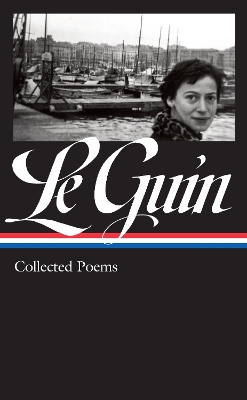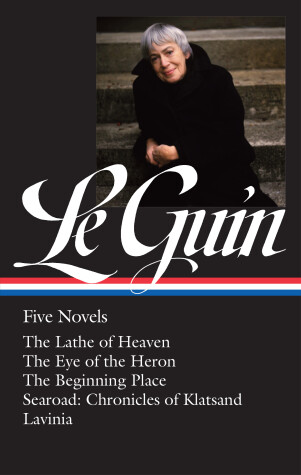LOA
2 primary works
Book 368
At last, a major American poet collected for the first time in the sixth volume of the definitive Library of Edition of her works
STARRED REVIEW IN PUBLISHERS WEEKLY
Ursula K. Le Guin’s career began and ended with poetry. This sixth volume in the definitive Library of...Read more
STARRED REVIEW IN PUBLISHERS WEEKLY
Ursula K. Le Guin’s career began and ended with poetry. This sixth volume in the definitive Library of...Read more
At last, a major American poet collected for the first time in the sixth volume of the definitive Library of Edition of her works
STARRED REVIEW IN PUBLISHERS WEEKLY
Ursula K. Le Guin’s career began and ended with poetry. This sixth volume in the definitive Library of America edition of her works gathers, for the first time, her collected poems—from her earliest collection Wild Angels (1974) through her final publication, the collection So Far So Good, which she delivered to her editor just a week before her death in 2018.
The themes explored in the poems gathered here resonate through all Le Guin’s oeuvre, but find their strongest voice in her poetry: exploration as a metaphor for both human bravery and creativity, the mystery and fragility of nature and the impact of humankind on their environment, the Tao Te Ching, marriage, womanhood, and even cats. Le Guin’s poetry is often traditional in form but never in style: her verse is earthy, surprising, and lyrical.
Including some 40 poems never before collected, this volume restores to print much of Le Guin's remarkable verse. It features a new introduction by editor Harold Bloom, written before his death in 2019, in which he reflects on the power of Le Guin’s poems, which he calls “American originals.” It also features helpful explanatory notes and a chronology of Le Guin’s life.
STARRED REVIEW IN PUBLISHERS WEEKLY
Ursula K. Le Guin’s career began and ended with poetry. This sixth volume in the definitive Library of America edition of her works gathers, for the first time, her collected poems—from her earliest collection Wild Angels (1974) through her final publication, the collection So Far So Good, which she delivered to her editor just a week before her death in 2018.
The themes explored in the poems gathered here resonate through all Le Guin’s oeuvre, but find their strongest voice in her poetry: exploration as a metaphor for both human bravery and creativity, the mystery and fragility of nature and the impact of humankind on their environment, the Tao Te Ching, marriage, womanhood, and even cats. Le Guin’s poetry is often traditional in form but never in style: her verse is earthy, surprising, and lyrical.
Including some 40 poems never before collected, this volume restores to print much of Le Guin's remarkable verse. It features a new introduction by editor Harold Bloom, written before his death in 2019, in which he reflects on the power of Le Guin’s poems, which he calls “American originals.” It also features helpful explanatory notes and a chronology of Le Guin’s life.
Book 379
Together for the first time, all 5 standalone novels from the Hugo and Nebula award–winning writer who reinvented science fiction, including one restored to print
Spans from the 1971 classic The Lathe of Heaven to her career-crowning 2008 masterpiece Lavinia
This 7th volume in the definitive Library...Read more
Spans from the 1971 classic The Lathe of Heaven to her career-crowning 2008 masterpiece Lavinia
This 7th volume in the definitive Library...Read more
Together for the first time, all 5 standalone novels from the Hugo and Nebula award–winning writer who reinvented science fiction, including one restored to print
Spans from the 1971 classic The Lathe of Heaven to her career-crowning 2008 masterpiece Lavinia
This 7th volume in the definitive Library of America edition of Ursula K. Le Guin’s works presents 5 remarkable standalone novels that showcase her boundless creativity and literary range.
In the Locus Award–winning The Lathe of Heaven (1971), one of Le Guin’s most admired works of science fiction, George Orr begins have effective dreams: dreams that change reality itself. But when he turns to the sleep researcher William Haber for help, the doctor sees an opportunity to use Orr’s strange gift for his own ends.
A former Terran prison colony on the planet Victoria seems destined for revolution in The Eye of the Heron (1978), when the authoritarian leaders in the City try to assert control over the peaceful farmers who have been sent to live around them.
The Beginning Place (1980) is a parable-like story in which Hugh and Irena have both found their way to the Beginning Place, a gateway to another world. The two initially become enemies, but must learn to work together when the utopia they’ve found turns out to have a shadow.
The long out-of-print Searoad: Chronicles of Klatsand (1991) is a Winesburg, Ohio-like series of linked stories set in a small vacation town on the Oregon coast, where some of the characters have come for a weekend and some for longer, but all are pilgrims in the grip of inexpressible longings.
And Le Guin’s final, powerfully feminist novel, Lavinia (2008), reimagines Virgil's Aeneid from the perspective of a woman who, in poet's telling, never speaks a word.
Special features include an appendix presenting three essays by Le Guin related to the novels, previously unseen hand-drawn maps by author herself, helpful annotation, and a chronology of Le Guin's life and career.
Brought together here for the first time, these 5 remarkable standalone novels showcase a Hugo and Nebula Award–winning master at her very best.
Spans from the 1971 classic The Lathe of Heaven to her career-crowning 2008 masterpiece Lavinia
This 7th volume in the definitive Library of America edition of Ursula K. Le Guin’s works presents 5 remarkable standalone novels that showcase her boundless creativity and literary range.
In the Locus Award–winning The Lathe of Heaven (1971), one of Le Guin’s most admired works of science fiction, George Orr begins have effective dreams: dreams that change reality itself. But when he turns to the sleep researcher William Haber for help, the doctor sees an opportunity to use Orr’s strange gift for his own ends.
A former Terran prison colony on the planet Victoria seems destined for revolution in The Eye of the Heron (1978), when the authoritarian leaders in the City try to assert control over the peaceful farmers who have been sent to live around them.
The Beginning Place (1980) is a parable-like story in which Hugh and Irena have both found their way to the Beginning Place, a gateway to another world. The two initially become enemies, but must learn to work together when the utopia they’ve found turns out to have a shadow.
The long out-of-print Searoad: Chronicles of Klatsand (1991) is a Winesburg, Ohio-like series of linked stories set in a small vacation town on the Oregon coast, where some of the characters have come for a weekend and some for longer, but all are pilgrims in the grip of inexpressible longings.
And Le Guin’s final, powerfully feminist novel, Lavinia (2008), reimagines Virgil's Aeneid from the perspective of a woman who, in poet's telling, never speaks a word.
Special features include an appendix presenting three essays by Le Guin related to the novels, previously unseen hand-drawn maps by author herself, helpful annotation, and a chronology of Le Guin's life and career.
Brought together here for the first time, these 5 remarkable standalone novels showcase a Hugo and Nebula Award–winning master at her very best.


